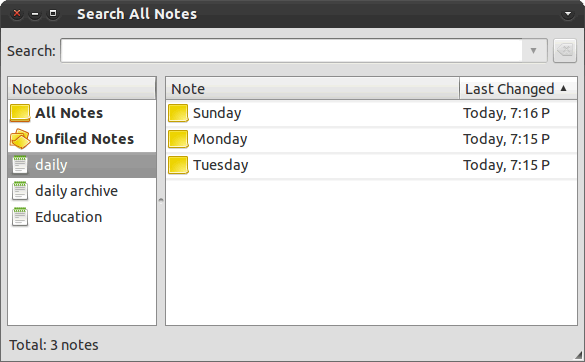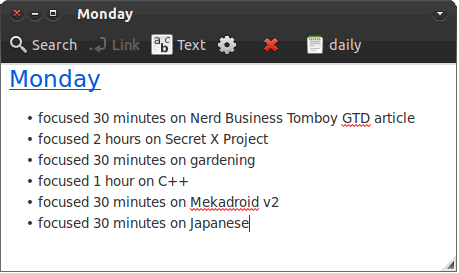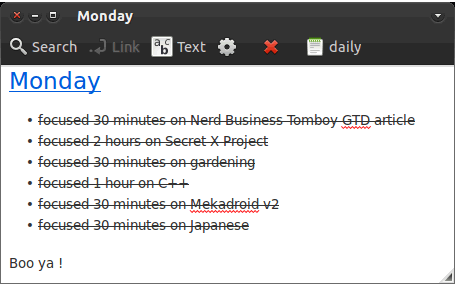My GTD strategy using Tomboy notes

Tomboy is simple note taking software. Runs on Windows, Mac and of course, Linux. It's included in Ubuntu as a default application.
I have been using it every day as part of my own personal GTD strategy. This strategy is a system I've developed over the years as a freelance entrepreneur. If you've read my recent post on how to keep daily notes on the iPad you'll know the gist of it.
Anyway, iPad Notes is really basic - truth be told, I much prefer Tomboy Notes. I'm quite happy with how it integrates with my GTD strategy. Here's a brief tutorial on how to set it up for yourself.
Setup Tomboy with daily notes
Open Tomboy and create a new Notebook called "daily".
In this Notebook, create three new notes. One for tomorrow, the next day, and the next day after that. Name them accordingly (ex: Sunday, Monday, Tuesday).
Now create another Notebook. Call this one "daily archive". As each day passes, you will simply drag your daily notes into this folder to archive them.

Focus is the key
I mentioned this was a GTD strategy. That's short for getting things done. Which is indeed the net result of this strategy. Yet my process is a little different than usual. The key is this: uninterrupted blocks of time reserved for focus. On a specific area of your life. If you reserve the time, sharpen your focus - your brain will do the rest.
And indeed, anything you focus on for an hour a day will eventually get done. Even if you have no idea what to do. Even if it's the biggest, most challenging project in your life. If you simply reserve a set amount of time each day to focus on it (or the general vicinity of "it") results will happen. At best, you'll make progress out of sheer boredom.
Build a list of focus topics
Choosing what to focus on is the easy part. You have any number of ongoing projects and responsibilities. But also you have goals. Big dreams. And even skills you want to improve. Or random things you just want to do.
List all of them in a new note in your daily Notebook called "Focus Topics". It should looks something like this:

And so forth (your topic list will grow constantly with new entries).
Create your days
The next step is to begin the process of selecting which topics are most pressing. You do this by entering them into your upcoming days; in the 3 blank notes you created during the first step.

There are just 4 rules for this day structure.
First, do not set a specific time. Rather, set an amount of time. In this way, you are not 'scheduling' (which is tedious) but rather, you are 'reserving'. Reserving a chunk of time for focused thinking is more effective than scheduling a time to complete a specific task. Certainly, it's a lot easier to manage.
Secondly, do not edit and change your day once it has been established. This will quickly make the schedule irrelevant. The idea is to get better at knowing what you'll need to focus on in order to achieve your success (or whatever results you're after). And plan accordingly.
From my experience, planning just 3 days ahead is plenty. Any more than that, and your daily schedule will become increasingly irrelevant to what you really should be doing.
Thirdly, cap your total amount of focus to no longer than 5 hours in a single day. If you're a full time entrepreneur, you might be tempted to schedule a full 8 hour day like this, but trust me - it's quite rare to actually have 8 hours of uninterrupted focus time available on a given day (I envy you if you do). Depending on your career and life arrangement - you may need to start with just an hour, two or maybe three hours of reserved focus time.
Finally: use past tense. Write everything as if it has already been done. Because if you are confident in that what you write down will get done, there is no better way to write it than - as if it already has been done. This may be entirely psychological, but I feel it makes the schedule more effective. And this way if you happen to get more stuff done - you can simply add them at the end of the day, in similar fashion.
How to focus
The final step entails actually focusing on a given topic for a set amount of time. Try it, even right now - pick any topic, write it out including the duration in a Tomboy note (ex: focused 60 minutes on "insert topic here"). And then focus on it.
During this time you will not be accepting any phonecalls. You will not be receiving emails. And you will not be on Twitter. The idea is to create a quiet environment so your mind can shift it's full attention precisely to the target topic. It is this level of focus, I believe, which is required for manifesting significant progress.
If you were successful, if you truly achieved a full block of focus, give yourself a pat on the back. Or, what I do, is simply cross-off the completed item on my daily list.

Godspeed
Nor system or person is perfect. As much as I have been religiously scheduling 5 hours of daily focus topics (every 3 days) I don't always get to everything. If not, it's no big deal. Move on to the next day and try again. If you're routinely having trouble getting everything done, your simply trying to do too much. Personally I found this a sobering realization. This system will quickly expose your limitations. There is only so much time in a day. And even less of that for pure, uninterrupted focus.
Eventually - as you find the sweet spot and begin completing sessions consistently - you'll inevitably see progress.


